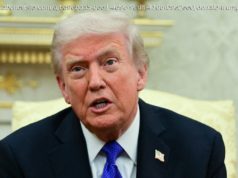Foes of the Paris climate agreement have gained the upper hand in the ongoing White House debate over whether the U. S. should pull out of the historic pact, according to participants in the discussions and those briefed on the deliberations, although President Trump has yet…
Foes of the Paris climate agreement have gained the upper hand in the ongoing White House debate over whether the U. S. should pull out of the historic pact, according to participants in the discussions and those briefed on the deliberations, although President Trump has yet to make a final decision.
Senior administration officials have met twice since Thursday to discuss whether the United States should abandon the U. N. accord struck in December 2015, under which the United States pledged to cut its greenhouse gas emissions 26 percent to 28 percent below 2005 levels by 2025.
The president’s aides remain divided over the international and domestic legal implications of remaining party to the agreement, which has provided a critical political opening for those pushing for an exit.
On Thursday several Cabinet members – including Environmental Protection Agency Administrator Scott Pruitt and Energy Secretary Rick Perry, who oppose the accord, and Secretary of State Rex Tillerson, who advocates remaining a party to it – met with top White House advisers, including Trump’s daughter Ivanka Trump and her husband, Jared Kushner, and Chief of Staff Reince Priebus. Both Ivanka Trump and Kushner advocate remaining part of the U. N. Framework Convention on Climate Change, even though the president has repeatedly criticized the global warming deal.
During that meeting, according to several people who spoke on the condition of anonymity to discuss internal deliberations, the White House counsel’s office informed participants that the United States could not remain in the agreement and lower the level of carbon cuts it would make by 2025. The administration is working to unravel many Obama-era policies underpinning that pledge, and the economic consulting firm Rhodium Group has estimated that the elimination of those policies would mean the United States would cut its emissions by 14 percent by 2025 compared with 21 percent if they remained in place.
This interpretation represented a change from the White House counsel’s earlier analysis and is at odds with the State Department’s view of the agreement.
Susan Biniaz, who served as the State Department’s lead climate lawyer from 1989 until earlier this year, said in an interview Tuesday that the agreement reached by nearly 200 nations in Paris allows for countries to alter their commitments in either direction.
«The Paris agreement provides for contributions to be nationally determined and it encourages countries, if they decide to change their targets, to make them more ambitious, » Biniaz said. «But it doesn’t legally prohibit them from changing them in another direction.»
Ivanka Trump urged White House staff secretary Rob Porter to convene a second meeting Monday with lawyers from both the White House and the State Department. That session addressed the question of America’s obligations under the 2015 deal as well as whether remaining in the agreement would make it more difficult for the administration to legally defend the changes it was making to the federal government’s existing climate policies, but it did not reach a final decision.
At a rally with supporters Saturday, Trump said he would make a “big decision” on Paris within the next two weeks and vowed to end «a broken system of global plunder at American expense.»
Administration advisers on both sides of the political spectrum, however, emphasized that the president himself would decide what path to pursue when it came to the climate agreement.
«In the end, President Trump, will make the final decision, regardless of where the staff conversations end up, » Thomas Pyle, who heads the conservative Institute for Energy Research and led the Trump transition team for the Energy Department, said in an email. «The environmental lobby is going to cause litigation problems on nearly every aspect of President Trump’s energy and environmental agenda whether or not the administration stays in the Paris Agreement. Staying in Paris only gives them another target to shoot at.»






